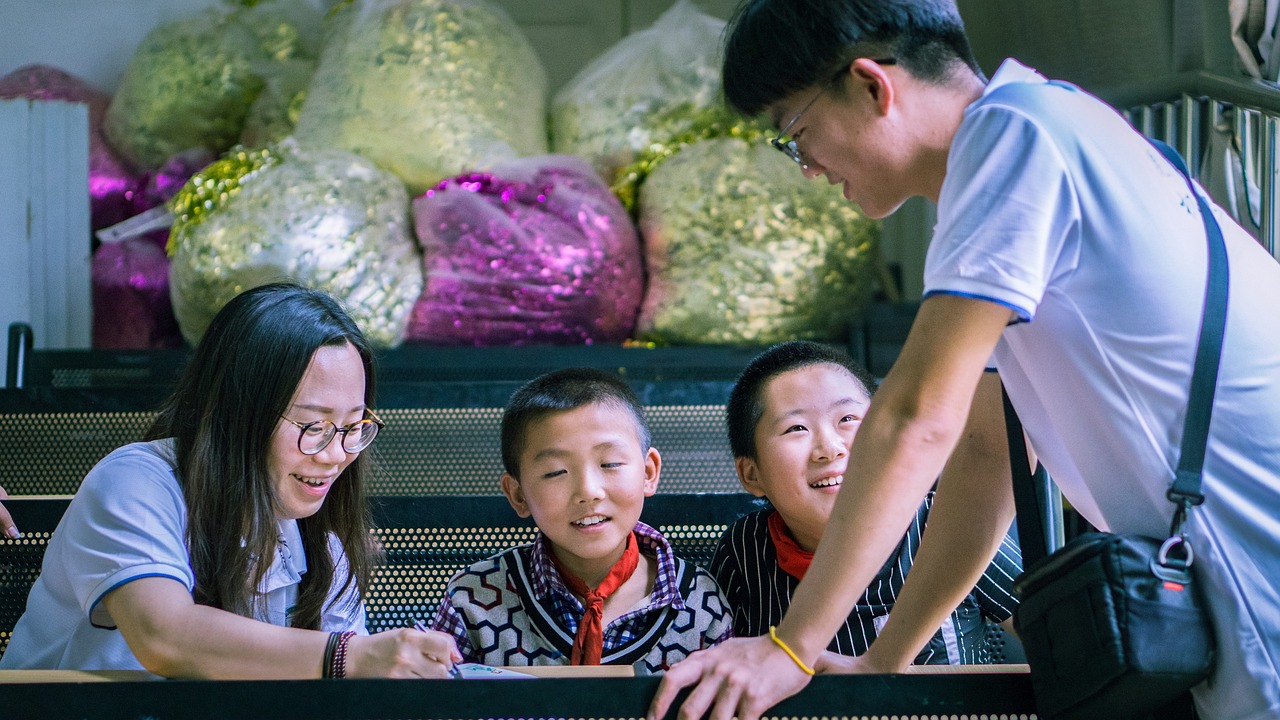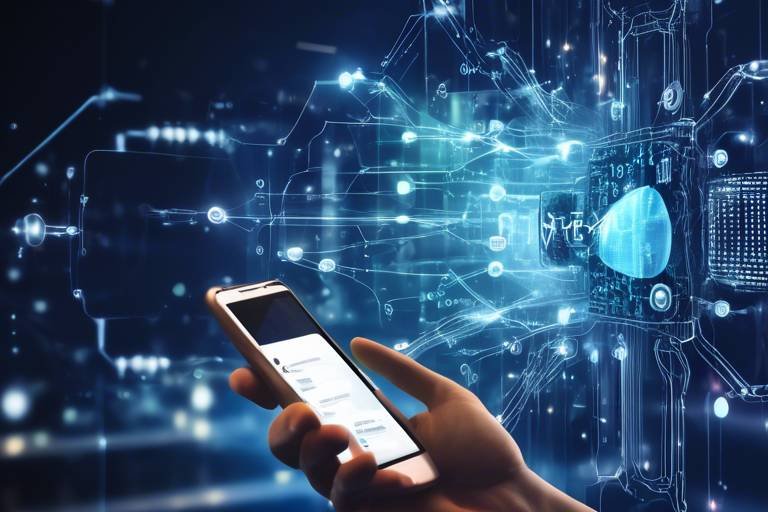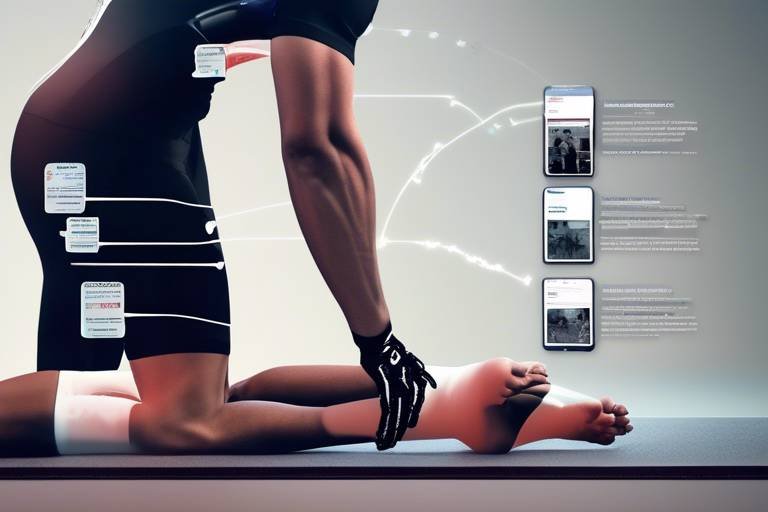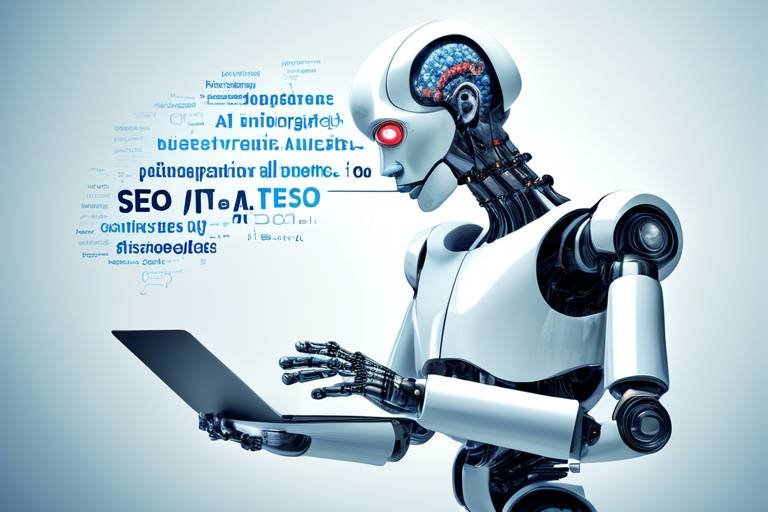How AI is Redefining the Future of Tutoring
In today's fast-paced world, artificial intelligence (AI) is making waves across various sectors, and education is no exception. The advent of AI in tutoring is not just a trend; it's a revolution that is reshaping how students learn and how educators teach. Imagine having a personalized tutor available 24/7, adapting to your unique learning style and pace. Sounds like something out of a sci-fi movie, right? But this is the reality we are stepping into, where AI is becoming an integral part of the educational landscape.
With AI, traditional tutoring methods are being transformed into dynamic learning experiences. No longer are we confined to one-size-fits-all approaches; instead, we are entering an era where education is tailored to fit each student's needs. This shift not only enhances engagement but also significantly boosts academic performance. Picture a student struggling with math concepts who can now receive instant feedback and support, allowing them to tackle challenges head-on. That’s the power of AI in education.
One of the most exciting aspects of AI in tutoring is its ability to provide personalized learning experiences. AI-driven platforms analyze a wealth of student performance data, identifying strengths and weaknesses. This analysis leads to customized learning paths that ensure every learner receives the support they need. For instance, if a student excels in reading but struggles with math, the AI can adjust the curriculum accordingly, focusing on math while maintaining reading practice. This level of personalization is unprecedented and is changing the way we think about education.
Moreover, adaptive learning technologies are at the forefront of this transformation. These technologies utilize sophisticated algorithms to adjust content delivery based on how students interact with the material. Imagine a student working through a math problem; if they get stuck, the system can offer hints or alternate explanations, allowing them to progress at their own pace. This immediate feedback loop keeps students engaged and motivated, making learning a more enjoyable experience.
Another remarkable feature of AI in tutoring is real-time progress tracking. Tutors can monitor student performance as it happens, enabling them to intervene when necessary. This means that if a student is struggling with a concept, the tutor can adjust their teaching strategy on the fly, ensuring that no one gets left behind. It’s like having a coach who knows exactly when to step in and provide guidance, making the learning process much more effective.
In addition to progress tracking, AI provides data-driven insights that empower educators. By analyzing patterns in student behavior, AI can reveal valuable information about how different students learn. This data allows teachers to refine their instructional methods, tailoring their approach to suit the needs of their classroom. It’s akin to having a crystal ball that helps educators foresee potential challenges and address them proactively.
AI-powered virtual tutoring assistants are another game-changer in the educational landscape. These assistants offer 24/7 support for students, answering questions and providing resources at any hour. This means that learning can extend beyond traditional classroom hours, allowing students to explore and learn whenever inspiration strikes. It’s like having a knowledgeable friend available at all times, ready to help with homework or clarify concepts.
As we look to the future, the trends in AI tutoring are incredibly promising. With advancements in technology, we can expect even more sophisticated algorithms that enhance personalization and broaden accessibility for learners around the globe. The potential for AI to democratize education is immense, making quality tutoring available to those who may have previously been underserved.
- What is AI tutoring? AI tutoring refers to the use of artificial intelligence technologies to provide personalized educational experiences, adapting to each student's learning style and pace.
- How does AI improve student engagement? AI enhances engagement by incorporating interactive elements and gamification, making learning more enjoyable and motivating for students.
- Can AI replace traditional tutors? While AI can greatly enhance the tutoring experience, it is not meant to replace human tutors but rather to complement their efforts by providing additional support and resources.
- Is AI tutoring accessible to everyone? As technology evolves, AI tutoring is becoming more accessible, with many platforms offering services that cater to diverse learning needs and backgrounds.

The Rise of AI in Education
The integration of artificial intelligence (AI) into education is not just a trend; it’s a revolutionary shift that is reshaping the landscape of tutoring as we know it. Gone are the days when tutoring was solely reliant on textbooks and traditional teaching methods. Today, AI is stepping in to offer a more dynamic and engaging approach to learning. Imagine a world where each student receives personalized attention tailored to their unique learning style, all thanks to the power of AI. This technology is breaking down barriers and making education more accessible and effective for students of all backgrounds.
As AI continues to evolve, it is introducing innovative strategies that enhance learning experiences. For example, AI-driven platforms can analyze a student’s performance data to identify strengths and weaknesses, enabling tutors to adjust their teaching methods accordingly. This level of personalization ensures that students are not just passive recipients of information; instead, they are active participants in their own educational journeys. By catering to individual needs, AI is significantly improving student engagement and academic performance.
Moreover, the rise of AI in education has led to the development of adaptive learning technologies. These systems utilize algorithms that modify content delivery based on how students interact with the material. For instance, if a student struggles with a particular concept, the AI can provide additional resources or adjust the difficulty level to ensure mastery before moving on. This adaptability allows students to progress at their own pace, fostering a more comfortable and effective learning environment.
Another exciting aspect of AI in education is the ability to track student progress in real-time. Tutors can now monitor how well their students are doing and identify areas that need improvement almost instantaneously. This capability enables timely interventions that can make a significant difference in educational outcomes. Instead of waiting for end-of-term results, educators can make informed decisions on-the-fly, ensuring that students receive the support they need precisely when they need it.
Furthermore, AI offers valuable data-driven insights that empower educators to refine their instructional methods. By analyzing patterns in student behavior and learning, AI provides a wealth of information that can help teachers understand what works and what doesn’t in their teaching strategies. This data-centric approach is a game changer, allowing for continuous improvement in educational practices and ultimately benefiting the students.
In conclusion, the rise of AI in education is not just about technology; it’s about creating a more personalized, engaging, and effective learning experience for students. As we embrace these advancements, we can expect to see a future where education is tailored to meet the needs of every learner, making it more accessible and impactful than ever before.
- How does AI personalize learning? AI analyzes student data to create customized learning paths that cater to individual strengths and weaknesses.
- What are adaptive learning technologies? These technologies modify content delivery based on student interactions, allowing for a personalized learning experience.
- Can AI help track student progress? Yes, AI enables real-time monitoring of student performance, allowing for timely interventions and support.
- How does AI enhance engagement in learning? AI incorporates gamified elements and interactive modules that make learning more enjoyable and motivating for students.

Personalized Learning Experiences
In today's fast-paced educational landscape, the concept of personalized learning has taken center stage, and AI is the driving force behind this transformation. Imagine a classroom where every student receives a customized learning experience tailored to their unique strengths and weaknesses. Sounds like a dream, right? Well, with AI-driven tutoring platforms, this dream is becoming a reality. These platforms analyze student performance data, allowing them to create individualized learning paths that cater specifically to each learner's needs. This means that instead of a one-size-fits-all approach, students can engage with material that resonates with them, making learning not just effective but also enjoyable.
One of the standout features of AI in personalized learning is its ability to adapt to individual learning styles. Each student learns differently; some may grasp concepts quickly, while others may need more time to understand. AI technologies utilize complex algorithms to assess how a student interacts with the material, adjusting content delivery in real-time. This means that if a student struggles with a particular topic, the system can provide additional resources or modify the difficulty level of the tasks at hand. It's like having a personal tutor who knows exactly when to push you and when to give you a breather.
Furthermore, the impact of these personalized experiences extends beyond just academic performance. When students feel that their educational needs are being met, their engagement levels soar. They become more motivated to learn, leading to improved retention of knowledge. In fact, research has shown that students who engage with personalized learning platforms often outperform their peers in traditional settings. This is not just about grades; it’s about fostering a love for learning that lasts a lifetime.
To illustrate the effectiveness of AI in creating personalized learning experiences, consider the following table that outlines the benefits of AI-driven tutoring platforms compared to traditional methods:
| Aspect | Traditional Tutoring | AI-Driven Tutoring |
|---|---|---|
| Customization | Limited to tutor's knowledge | Tailored to individual needs |
| Feedback | Delayed feedback | Real-time feedback |
| Engagement | Passive learning | Interactive and engaging |
| Accessibility | Limited hours | 24/7 availability |
In conclusion, the rise of AI in education is not just a trend; it's a revolution that is reshaping how we think about tutoring. With its ability to provide , AI is making education more accessible, engaging, and effective for students everywhere. As we continue down this exciting path, the possibilities for enhancing learning are truly limitless. Are you ready to embrace the future of tutoring?
- What is personalized learning? Personalized learning is an educational approach that tailors learning experiences to meet the individual needs of each student.
- How does AI enhance personalized learning? AI enhances personalized learning by analyzing student data to create customized learning paths, adapting content delivery, and providing real-time feedback.
- Are AI tutoring platforms available 24/7? Yes, many AI-powered tutoring platforms offer 24/7 support, allowing students to access resources and assistance at any time.
- Can AI improve student engagement? Absolutely! By making learning interactive and enjoyable, AI increases student engagement and motivation.

Adaptive Learning Technologies
Adaptive learning technologies are revolutionizing the way students engage with educational content. By leveraging sophisticated algorithms, these technologies tailor learning experiences to meet the unique needs of each student. Imagine walking into a classroom where the lesson is not a one-size-fits-all lecture, but rather a dynamic, personalized journey that adjusts in real-time based on your understanding. That’s the power of adaptive learning!
At the heart of adaptive learning is the ability to analyze a student's interactions and performance data continuously. This means that as a student works through their lessons, the system is constantly evaluating how well they grasp concepts. If a student struggles with a particular topic, the technology can modify the content delivery, offering additional resources or simplifying explanations until the student gains confidence. This is akin to having a personal tutor who knows your strengths and weaknesses, guiding you every step of the way.
One of the most exciting aspects of adaptive learning technologies is their capacity for real-time feedback. Students receive immediate responses to their answers, allowing them to understand mistakes and learn from them instantly. This quick feedback loop not only enhances comprehension but also keeps students motivated and engaged. Think about it: how often have you wished for instant clarification on a tricky math problem or a complex science concept? Adaptive learning makes that possible!
Furthermore, adaptive learning technologies often come equipped with features that allow for progress tracking. Educators can monitor how each student is progressing through the material, identifying areas where they excel or require additional support. This data-driven approach empowers teachers to make informed decisions about instructional strategies, ensuring that every student receives the guidance they need to succeed.
To illustrate how adaptive learning technologies work, consider the following table that outlines the key components:
| Component | Description |
|---|---|
| Data Analysis | Continuous evaluation of student performance to tailor learning paths. |
| Content Modification | Adjusts difficulty and type of content based on student interactions. |
| Feedback Mechanism | Provides immediate feedback on assessments, enhancing understanding. |
| Progress Monitoring | Tracks student progress and identifies areas needing attention. |
In summary, adaptive learning technologies are not just a trend; they represent a significant shift in educational paradigms. By personalizing the learning experience, they ensure that students are not left behind, and they foster a more engaging and effective educational environment. As these technologies continue to evolve, we can expect even more innovative solutions that will shape the future of tutoring and education as a whole.
- What are adaptive learning technologies? Adaptive learning technologies are systems that tailor educational content to meet the individual needs of students based on their performance and interactions.
- How do these technologies benefit students? They provide personalized learning experiences, immediate feedback, and allow for progress tracking, which helps in identifying areas where students may need additional support.
- Can adaptive learning technologies be used in all subjects? Yes, adaptive learning can be applied across various subjects, including math, science, language arts, and more, making it a versatile tool in education.

Real-Time Progress Tracking
Imagine being able to see your child's learning journey unfold in real-time, as if you were watching a live sports game. With the advent of AI in tutoring, has become a game-changer for both students and educators. This innovative feature allows tutors to monitor how students are performing at any given moment, making it possible to provide immediate feedback and support when it's most needed.
Gone are the days when progress assessments were limited to end-of-term exams or periodic quizzes. Now, AI-driven platforms collect data continuously, analyzing student interactions and performance metrics. This means that as soon as a student struggles with a concept, tutors can step in, offering guidance or adjusting the learning materials to better suit the student's needs. This level of responsiveness not only enhances the learning experience but also fosters a sense of trust and support between students and their tutors.
Furthermore, real-time tracking can also help identify patterns in a student's learning behavior. For example, if a student consistently struggles with a specific type of problem, the AI can flag this and suggest targeted resources or exercises to help them improve. This proactive approach is akin to having a personal coach who knows exactly when to push you harder or when to offer a helping hand. The result? Students are more likely to stay engaged and motivated, as they see tangible improvements in their skills.
| Benefits of Real-Time Progress Tracking | Description |
|---|---|
| Immediate Feedback | Students receive instant insights on their performance, allowing for quick corrections and adjustments. |
| Personalized Learning Paths | Tutors can tailor educational content based on real-time data, ensuring lessons are relevant to each student's needs. |
| Enhanced Engagement | Students are more engaged when they see their progress in real-time, motivating them to keep pushing forward. |
| Data-Driven Decisions | Educators can make informed choices about instructional strategies based on comprehensive performance analytics. |
In essence, transforms the tutoring landscape into a dynamic and responsive learning environment. It's not just about tracking grades; it's about understanding the learning process on a deeper level. With AI at the helm, students can navigate their educational journeys with confidence, knowing that they have the support and resources they need to succeed.
- What is real-time progress tracking?
Real-time progress tracking refers to the ability to monitor a student's performance continuously as they engage with learning materials, allowing for immediate feedback and support. - How does AI facilitate real-time progress tracking?
AI analyzes student interactions and performance data, enabling tutors to see how students are doing at any moment and adjust their teaching strategies accordingly. - Why is real-time feedback important?
Immediate feedback helps students correct mistakes on the spot, reinforces learning, and keeps them motivated by showing them their progress.

Data-Driven Insights
In the world of education, are becoming a game-changer for both tutors and students. Imagine having a treasure trove of information right at your fingertips, revealing not just how well a student is performing, but also uncovering the nuances of their learning habits. With the integration of AI in tutoring, this is no longer a distant dream; it's a reality that is redefining the educational landscape.
AI tools analyze vast amounts of data from student interactions, assessments, and even behavioral patterns. This analysis enables educators to identify trends and areas of improvement that might not be visible through traditional methods. For example, if a student consistently struggles with a particular subject or concept, AI can highlight this issue, allowing tutors to intervene with targeted strategies. This proactive approach ensures that no student falls through the cracks, making learning a more inclusive experience.
Furthermore, the insights derived from AI can lead to the creation of customized learning plans. These plans are not one-size-fits-all; instead, they are tailored to meet the unique needs of each student. By understanding individual learning styles, strengths, and weaknesses, educators can deploy strategies that resonate with each learner. For instance, a student who excels in visual learning might benefit from interactive diagrams and videos, while another who prefers auditory learning may thrive with podcasts and discussions.
To illustrate the impact of data-driven insights, consider the following table that showcases the transformation in student performance before and after AI intervention:
| Student | Subject | Performance Before AI | Performance After AI |
|---|---|---|---|
| John Doe | Math | 65% | 85% |
| Jane Smith | Science | 70% | 90% |
| Emily Johnson | English | 60% | 80% |
This data not only highlights the improvement in grades but also demonstrates how AI-driven insights can guide educators in refining their teaching methods. By regularly reviewing these insights, tutors can adapt their approaches, ensuring that they are always aligned with the evolving needs of their students.
Moreover, the ability to track progress over time helps in building a comprehensive profile for each learner. This profile can serve as a valuable resource during parent-teacher meetings, providing concrete evidence of a student's journey and achievements. Parents appreciate transparency, and with AI, they can see exactly how their child is progressing and where they might need additional support.
In essence, are not just about numbers; they are about understanding the story behind those numbers. They empower educators to make informed decisions that can lead to significant improvements in student outcomes. By leveraging these insights, tutors can create a more engaging, responsive, and effective learning environment that truly caters to the needs of every student.
- What are data-driven insights in education?
Data-driven insights refer to the analysis of student performance and behavior metrics to inform teaching strategies and improve learning outcomes.
- How does AI help in personalizing learning?
AI analyzes individual student data to create customized learning plans that cater to their unique strengths and weaknesses.
- Can data-driven insights improve student engagement?
Yes, by identifying areas where students struggle, educators can implement strategies that enhance engagement and motivation.

Virtual Tutoring Assistants
Imagine having a personal tutor available at your fingertips, ready to assist you 24/7. This is the reality brought to life by AI-powered virtual tutoring assistants. These digital companions are revolutionizing the way students engage with learning materials, providing support that extends well beyond the confines of traditional classroom hours. With the ability to answer questions, provide resources, and even guide students through complex topics, virtual assistants are becoming indispensable tools in the educational landscape.
One of the most remarkable features of these virtual tutors is their availability. Unlike human tutors who have limited hours, AI assistants are always on call, ready to help students whenever they need it. This means that whether it’s a late-night homework session or a last-minute study cramming before a big exam, students can access assistance without the constraints of time. This flexibility can significantly reduce stress and enhance learning outcomes, as students can seek help whenever they feel stuck.
Moreover, these virtual tutors utilize advanced algorithms to tailor their responses based on individual student needs. They analyze the questions asked and the context in which they are posed, allowing them to provide relevant and accurate information. This level of personalization ensures that students receive guidance that is not only immediate but also aligned with their current learning objectives. For instance, if a student struggles with a specific math problem, the virtual assistant can offer step-by-step explanations or direct them to additional resources that reinforce the concept.
Additionally, virtual tutoring assistants can facilitate a more interactive learning experience. By integrating gamified elements and quizzes, they can engage students in a way that traditional methods often fail to do. This interactivity helps maintain student interest and motivation, making learning feel less like a chore and more like an exciting challenge. For example, a virtual tutor might present a math problem in the form of a game, rewarding students with points or badges for correct answers, thereby fostering a sense of achievement and encouraging continuous learning.
In summary, AI-powered virtual tutoring assistants are not just a trend; they represent a fundamental shift in how education is delivered. With their ability to provide round-the-clock support, personalized feedback, and engaging learning experiences, these digital tutors are paving the way for a more accessible and effective educational environment. As we move forward, the role of virtual assistants in tutoring will only become more prominent, shaping the future of learning for students around the globe.
- What is a virtual tutoring assistant?
A virtual tutoring assistant is an AI-powered tool that provides students with support and resources for their learning needs, available 24/7. - How does a virtual tutor personalize learning?
Virtual tutors analyze student interactions and questions to tailor their responses and resources to meet individual learning objectives. - Can virtual tutoring assistants help with all subjects?
Yes, many virtual tutoring assistants are designed to cover a wide range of subjects, providing assistance in areas like math, science, language arts, and more. - Are virtual tutoring assistants effective?
Research shows that students who use virtual tutoring assistants often experience improved engagement, understanding, and academic performance.

Enhanced Engagement through Gamification
In today's fast-paced world, capturing a student's attention can feel like trying to catch smoke with your bare hands. This is where gamification comes into play, transforming mundane learning experiences into exciting adventures. By integrating game-like elements into tutoring sessions, AI not only makes learning more interactive but also fosters a sense of motivation that traditional methods often lack. Imagine a student tackling math problems while earning points and badges, feeling like a hero in their own educational quest!
Gamification leverages the innate human desire for competition and achievement. It introduces interactive learning modules that encourage students to engage actively with the material. For instance, a math tutoring app might present challenging puzzles that students must solve to unlock the next level. This approach not only reinforces the concepts being taught but also makes the learning process feel less like a chore and more like a game. Students are more likely to retain information when they are emotionally invested in the learning experience.
One of the key components of gamification is the implementation of reward systems and incentives. These systems can range from simple point systems to elaborate achievements that students can showcase. By earning rewards for completing tasks or reaching milestones, students experience a sense of accomplishment that propels them to continue learning. This creates a positive feedback loop: the more they learn, the more they are rewarded, and the more motivated they become. It's a classic case of positive reinforcement that can lead to improved academic performance.
Moreover, AI can analyze student interactions with these gamified elements to provide personalized feedback. For example, if a student struggles with a particular type of problem, the system can adapt by offering additional challenges that target that specific weakness. This level of customization ensures that students are not just passively consuming information but actively participating in their own learning journey.
As we look towards the future of education, the role of gamification in AI-driven tutoring will likely expand. We can expect to see even more sophisticated systems that incorporate virtual reality and augmented reality to create immersive learning environments. Imagine studying history by stepping into a virtual world where you can explore ancient civilizations or solving physics problems while navigating a 3D space. The possibilities are endless!
Ultimately, the goal of incorporating gamification into tutoring is to make learning enjoyable and effective. By transforming educational content into engaging experiences, we can inspire a generation of learners who are not only knowledgeable but also enthusiastic about their education. In this new era of AI-enhanced tutoring, students are not just passive recipients of information; they are active participants in a thrilling journey of discovery and growth.
- What is gamification in education? Gamification in education refers to the integration of game-like elements into learning activities to enhance engagement and motivation.
- How does AI enhance gamification? AI analyzes student interactions and adapts learning experiences based on individual performance, making gamified learning more personalized and effective.
- Can gamification improve academic performance? Yes, by making learning more engaging and rewarding, gamification can lead to better retention of knowledge and improved academic outcomes.
- What are some examples of gamified learning? Examples include educational apps that reward students with points for completing tasks, interactive quizzes, and virtual reality experiences that immerse students in the subject matter.

Interactive Learning Modules
In the ever-evolving landscape of education, powered by AI are revolutionizing the way students engage with content. Imagine stepping into a virtual classroom where lessons come to life, and learning feels more like a game than a chore. These modules are designed to captivate students' attention and foster a deeper understanding of complex subjects by turning traditional learning methods on their head.
One of the most exciting aspects of these interactive modules is their ability to incorporate real-time feedback. As students navigate through various scenarios and challenges, they receive instant responses that guide them toward mastery. This immediate reinforcement not only helps in correcting mistakes but also boosts confidence, making learning a more rewarding experience. Think of it as having a personal coach who is always there to cheer you on and provide support when you stumble.
Furthermore, these modules often utilize gamification techniques, which transform mundane lessons into engaging quests. For instance, a student learning about fractions might embark on a treasure hunt where solving fraction problems unlocks clues to find hidden treasures. This playful approach not only enhances retention but also encourages students to take risks and explore new concepts without the fear of failure. The thrill of competition and the joy of achievement can turn even the most reluctant learners into enthusiastic participants.
Additionally, AI-driven interactive modules can adapt to a student’s progress and learning style. If a student struggles with a particular topic, the system can alter the difficulty level or provide alternative explanations and resources tailored to their needs. This personalized approach ensures that every learner can progress at their own pace, making education more inclusive and effective. For example, a table below illustrates how different learning styles can be addressed:
| Learning Style | Module Adaptation |
|---|---|
| Visual Learners | Incorporate infographics and videos |
| Auditory Learners | Use podcasts and audio explanations |
| Kinesthetic Learners | Include hands-on activities and simulations |
Ultimately, the goal of these interactive learning modules is to create an environment where students are not just passive recipients of information but active participants in their educational journey. As they engage with the content, they develop critical thinking skills and a love for learning that can last a lifetime. With AI at the helm, the future of education looks brighter than ever, promising an engaging and enriching experience for all.
- What are interactive learning modules?
These are AI-powered educational tools that engage students through gamification and real-time feedback, making learning more interactive and enjoyable.
- How do interactive modules adapt to different learning styles?
They analyze student performance and adjust the content delivery based on individual preferences, ensuring personalized learning experiences.
- Can interactive learning modules improve student engagement?
Absolutely! By incorporating game-like elements and instant feedback, these modules motivate students and enhance their interest in the subject matter.

Reward Systems and Incentives
This article explores the transformative impact of artificial intelligence on tutoring, highlighting innovative strategies and tools that enhance learning experiences for students and educators alike.
AI's integration into education is reshaping traditional tutoring methods, offering personalized learning experiences that cater to individual student needs, thereby improving engagement and academic performance.
AI-driven tutoring platforms analyze student performance data to create customized learning paths, ensuring that each learner receives tailored support that aligns with their unique strengths and challenges.
Adaptive learning technologies utilize algorithms to modify content delivery based on student interactions, allowing them to progress at their own pace while receiving immediate feedback and support.
With AI, tutors can monitor student progress in real-time, enabling timely interventions and adjustments to learning strategies that enhance overall educational outcomes.
AI provides valuable insights into student behavior and learning patterns, empowering educators to make informed decisions and refine instructional methods for better results.
AI-powered virtual assistants offer 24/7 support for students, answering questions and providing resources, thus extending the learning environment beyond traditional classroom hours.
AI enhances student engagement by incorporating gamified elements into tutoring sessions, making learning more interactive and enjoyable while fostering motivation and retention of knowledge.
Through gamification, AI creates interactive learning modules that encourage active participation, helping students grasp complex concepts through playful and immersive experiences.
One of the most exciting aspects of AI in tutoring is the implementation of . These systems are designed to motivate students by recognizing their achievements, no matter how big or small. Imagine a classroom where every completed task earns a student points, badges, or even virtual currency that can be used to unlock new learning modules or fun activities. This not only makes learning feel like a game but also instills a sense of accomplishment.
For instance, students could earn:
- Points for completing assignments or participating in discussions.
- Badges for mastering specific skills or reaching milestones.
- Leaderboards that showcase top performers, fostering a healthy sense of competition.
These reward systems can be tailored to each learner's preferences, creating a personalized experience that resonates with their individual motivations. For example, a student who loves art might receive access to creative projects as a reward, while another who enjoys science could unlock advanced experiments. The flexibility of AI allows for a truly customized approach to motivation.
Moreover, the data collected through these systems can provide educators with insights into what drives each student. By understanding which rewards resonate most, teachers can refine their strategies to keep students engaged and progressing in their learning journey. In essence, AI not only enhances the learning experience but also transforms it into a dynamic environment where students are eager to learn and grow.
As technology evolves, the future of AI in tutoring promises even greater advancements, including more sophisticated algorithms, enhanced personalization, and broader accessibility for learners worldwide.
- How does AI personalize learning experiences?
AI analyzes individual student data to create customized learning paths, ensuring that each student receives support tailored to their unique strengths and challenges. - Can AI tutoring replace traditional teachers?
No, AI tutoring is designed to complement traditional teaching methods, providing additional support and resources to enhance the learning experience. - What are the benefits of gamification in learning?
Gamification increases student engagement, motivation, and retention of knowledge by making learning interactive and enjoyable. - Are AI tutoring systems accessible to all students?
Many AI tutoring platforms aim to be accessible, offering resources that can reach a diverse range of learners, regardless of their background or location.

Future Trends in AI Tutoring
As we look ahead, the landscape of AI tutoring is poised for remarkable evolution. The advancements in technology are not just a fleeting trend; they represent a profound shift in how we approach education. Imagine a world where every learner, regardless of their background, has access to a personalized tutor available at any hour of the day. This is not just a dream—it's becoming a reality!
One of the most exciting trends is the development of more sophisticated algorithms that can analyze vast amounts of data. These algorithms will not only track student performance but will also predict future learning challenges. Think of it like having a crystal ball that helps educators foresee potential hurdles before they become significant issues. This proactive approach allows for timely interventions, ensuring that students stay on track.
Moreover, the concept of enhanced personalization will take center stage. AI will be able to tailor learning experiences even more finely, adapting to the individual learning styles and paces of each student. For instance, if a student struggles with a particular math concept, the AI tutor can provide additional resources, exercises, and explanations specifically designed for that topic. Picture a tutor who knows you so well that they can anticipate your needs before you even voice them!
Accessibility will also see a tremendous boost. With the rise of mobile technology and internet connectivity, AI tutoring platforms will become available to learners in remote areas, breaking down geographical barriers. This means that a student in a rural village can receive the same quality of education as one in a bustling city. The democratization of education is not just a buzzword; it's an achievable goal that AI is helping to realize.
Furthermore, we can expect to see an increase in collaborative learning environments facilitated by AI. These platforms will encourage students to work together on projects, share insights, and learn from one another, all while being guided by AI tools that enhance group dynamics. Imagine a virtual classroom where students from different corners of the globe can collaborate on a science project in real-time, sharing diverse perspectives and ideas!
Lastly, as AI continues to evolve, we may witness the emergence of emotional intelligence in AI tutors. Future AI systems could be designed to recognize and respond to students' emotional states, providing support not just academically but also emotionally. This could lead to a more holistic approach to education, where students feel understood and supported on multiple levels. It's like having a tutor who not only helps you with your homework but also knows when you're feeling overwhelmed and offers a comforting word.
- What is AI tutoring? AI tutoring refers to the use of artificial intelligence technologies to provide personalized educational support and resources to students.
- How does AI improve learning experiences? AI enhances learning by analyzing individual student data, creating tailored educational paths, and providing real-time feedback.
- Will AI replace human tutors? While AI can supplement traditional tutoring, it is unlikely to replace human interaction entirely. The best outcomes often combine both AI and human guidance.
- What are the benefits of gamification in AI tutoring? Gamification increases student engagement, motivation, and retention of knowledge through interactive and enjoyable learning experiences.
- How can AI help students with learning disabilities? AI can provide customized learning strategies and resources that cater specifically to the needs of students with learning disabilities, ensuring they receive the support they require.
Frequently Asked Questions
- How does AI personalize learning experiences for students?
AI personalizes learning by analyzing student performance data and creating customized learning paths. This means that each student receives tailored support that aligns with their unique strengths and challenges, making learning more effective and engaging.
- What are adaptive learning technologies?
Adaptive learning technologies use algorithms to modify content delivery based on how students interact with the material. This allows students to progress at their own pace, receiving immediate feedback and support, which enhances their overall learning experience.
- Can tutors track student progress in real-time?
Absolutely! With AI, tutors can monitor student progress in real-time. This capability enables timely interventions and adjustments to learning strategies, ensuring that students receive the support they need exactly when they need it.
- How does AI enhance student engagement?
AI enhances engagement by incorporating gamified elements into tutoring sessions. This makes learning more interactive and enjoyable, fostering motivation and helping students retain knowledge better through playful and immersive experiences.
- What role do virtual tutoring assistants play?
AI-powered virtual tutoring assistants provide 24/7 support for students. They can answer questions, provide resources, and extend the learning environment beyond traditional classroom hours, making education more accessible.
- What future trends can we expect in AI tutoring?
The future of AI in tutoring promises advancements like more sophisticated algorithms, enhanced personalization, and broader accessibility for learners worldwide. This evolution will continue to reshape how education is delivered and experienced.



















